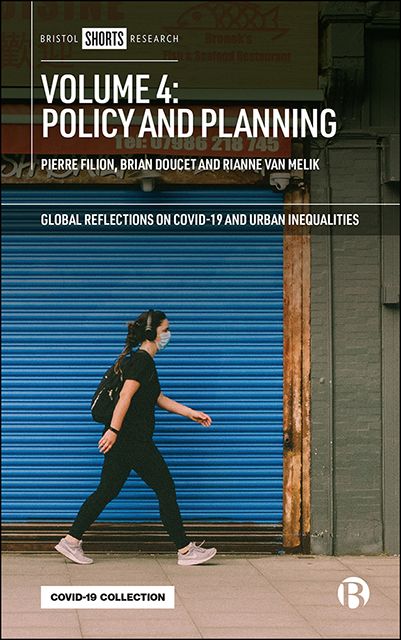Book contents
- Frontmatter
- Contents
- List of Figures and Tables
- Notes on Contributors
- Acknowledgments
- Preface to All Four Volumes of Global Reflections on COVID-19 and Urban Inequalities
- One Introduction: Policy Making in the Face of Uncertainty and Inequality
- Part I COVID-19 and Urban Changes
- Part II The Pandemic, Social Inequality, and Mobilization
- Part III Municipal and Urban Policy Responses
- Index
Nine - On Standby? But for How Long? The Impact of COVID-19 Lockdown Measures on the Urban Poor of Sri Lanka
Published online by Cambridge University Press: 25 April 2023
- Frontmatter
- Contents
- List of Figures and Tables
- Notes on Contributors
- Acknowledgments
- Preface to All Four Volumes of Global Reflections on COVID-19 and Urban Inequalities
- One Introduction: Policy Making in the Face of Uncertainty and Inequality
- Part I COVID-19 and Urban Changes
- Part II The Pandemic, Social Inequality, and Mobilization
- Part III Municipal and Urban Policy Responses
- Index
Summary
Epidemics and pandemics have always had crippling effects on urban centers and cities. The World Bank forecasts that the shocks of the ongoing COVID-19 pandemic will result in a category of ‘new poor’, of which over 30 percent will be residents of urban areas (Sanchez-Paramo, 2020). The International Labour Organization (ILO) anticipates that their loss of labor may be permanent, resulting in a sustained rather than temporary increase in poverty levels in urban areas (ILO, 2020). While for Sri Lanka as a whole the poor are unevenly distributed and particularly skewed towards rural regions, including inland plantations, there is a substantial urban population working in the informal sector in Sri Lanka's cities and towns (Turkstra et al, 2018). Because of stagnant informal sector income, by and large, they have profited little from the economic growth that the country has achieved over the last decade (Senanayake et al, 2015).
In this chapter, we explore how the urban poor working in the informal sector, who reside in parts of the city with high population density, cramped living conditions, poor access to potable water and sanitation, and congested public transport systems, are affected by government measures, such as mobility restrictions, enforced in order to halt the spread of COVID-19 (World Health Organization (WHO), 2020).
The disproportionate impact on the urban informal sector
Entrepreneurial start-ups and small businesses can experience severe precarity in their economic viability due to the COVID-19 pandemic. These enterprises are particularly vulnerable to the uncertainty, reduced access to sources of finance, stalled repayment of delivered services and goods, breakdowns of market linkages, as well as an overall lack of protection associated with the pandemic (Dy and Jayawarna, 2020). Most workers in the informal sector are employed without signed contracts complying with labor regulations. They are also deprived of employment and livelihood protection such as health coverage, unemployment benefits, and savings for old age. Moreover, overall demand for their services is impeded by the shrinkage of the economy caused by COVID-19 (Benjamin et al, 2014).
During the COVID-19 curfew, the Centre for Poverty Analysis conducted an online survey to gain an understanding of the effects of the uncertainty people were facing as a result of the curfew measures enforced by the state.
- Type
- Chapter
- Information
- Volume 4: Policy and Planning , pp. 91 - 100Publisher: Bristol University PressPrint publication year: 2021



